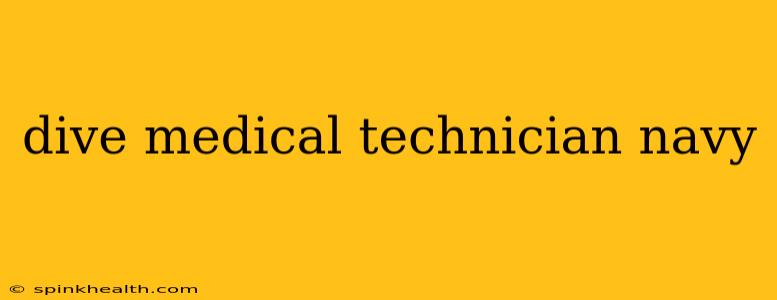The salty air whips through your hair as you stand on the deck of the USS Nimitz, the immensity of the ocean stretching out before you. You're not a sailor, not a pilot, not a submariner. You're something far more specialized, a vital cog in the Navy's underwater operations: a Dive Medical Technician (DMT). Your role isn't about navigating the depths, but ensuring the safety and well-being of those who do. It's a demanding, rewarding, and often unseen role crucial to the Navy's success.
This isn't your average medical job. Forget sterile hospital rooms; your office is the ocean, the hangar bay, and sometimes even a cramped decompression chamber. You're the bridge between the rigorous physical demands of diving and the medical expertise needed to keep divers safe. Let's dive into a typical day (pun intended!).
What Does a Navy Dive Medical Technician Do?
Your day could begin with pre-dive medical screenings. Each diver undergoes a thorough check-up – blood pressure, heart rate, lung capacity – ensuring they're physically fit for the upcoming dive. This isn't just a formality; it's a crucial safety measure. A single overlooked detail could have devastating consequences.
Following the pre-dive checks, you might spend time preparing the dive medical equipment. This involves meticulously inspecting oxygen tanks, checking the functionality of recompression chambers, and ensuring all necessary medications are readily available. Preparation is paramount; even the smallest oversight can have significant repercussions.
Once the divers are underwater, your job shifts to monitoring their progress. You're constantly in contact with the dive team, receiving regular updates on their status and environment. Any sign of distress, any unusual readings, and you're immediately on alert, ready to respond.
What are the Qualifications to Become a Navy Dive Medical Technician?
Becoming a Navy Dive Medical Technician isn't a walk in the park. It requires a combination of medical expertise, physical prowess, and a steadfast commitment to safety. You'll need:
- A strong medical background: A strong foundation in medicine is essential. This usually means completing a relevant medical program.
- Excellent physical fitness: Divers face significant physical challenges. The DMT themselves might not be diving, but they need to be physically fit enough to support the divers and handle emergency situations.
- A dedication to teamwork: Working in a dive team requires seamless collaboration. You'll be part of a close-knit team, and your ability to work effectively with others will be paramount.
- Exceptional problem-solving skills: Diving operations often present unexpected challenges. A DMT needs to be able to think on their feet, adapt to changing circumstances, and make crucial decisions under pressure.
What is the Training for a Navy Dive Medical Technician Like?
The training pipeline is rigorous. You’ll begin with extensive medical schooling, followed by specific dive medical training. This involves hands-on experience in simulated dive scenarios, learning to recognize and treat decompression sickness, and mastering the operation of recompression chambers. Expect long hours, challenging simulations, and demanding physical tests. Only the most dedicated and capable individuals succeed.
What is the Career Path for a Navy Dive Medical Technician?
A career as a Navy Dive Medical Technician offers a clear pathway for advancement. With experience and proven skills, you can move into leadership positions, take on more responsibility, and even specialize in specific aspects of dive medicine. The Navy invests in its personnel, providing opportunities for professional growth and leadership development.
What are the Risks Associated with Being a Navy Dive Medical Technician?
While the job is incredibly rewarding, there are inherent risks. You might face exposure to hazardous materials, long hours under stressful conditions, and the psychological impact of dealing with diving-related emergencies. The Navy provides comprehensive support to its DMTs to mitigate these risks, but understanding the potential challenges is vital.
How Can I Become a Navy Dive Medical Technician?
The path to becoming a DMT begins with exploring the Navy's recruitment process. Research the educational requirements, fitness standards, and specific qualifications needed. Connect with a Navy recruiter to discuss your options and determine if this career path aligns with your goals and aspirations. Remember, the journey is rigorous, but the rewards, both personal and professional, are substantial.
The life of a Navy Dive Medical Technician is a blend of medical expertise, unwavering dedication, and a deep appreciation for the challenging world of underwater operations. It's a career where you'll make a tangible difference, playing a critical role in the safety and success of Navy divers, every single day.

